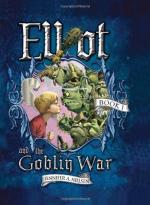“Just take anither wee rest, Mysie,” said Robert. “I’ll keep pickin’ as hard as I can, an’ ye’ll no’ be sae muckle missed.”
“Oh, I’ll hae to keep on, too,” she replied, almost despairingly, with a hint of tears in her voice. “Ye mind I promised to work hard, an’ ye said I was a guid worker, too. If I dinna’ keep on I micht only get a shillin’ a day.”
“But I’ll pick as much as the twa o’ us can do,” pursued Robert, with persuasive voice. “I’ll gang harder, until ye can get a wee rest.”
So Mysie, in sheer exhaustion, stopped for a little, and the dizzy feeling was soon gone again. Yet the horrible pain in the back troubled them all day, and the dizziness returned frequently, but the others assured them that they’d soon get used to it. Their hands were cut, bruised and dirty, and poor little Mysie felt often that she would like to cry, but “six and sixpence a week” kept time in her heart to all her troubles, and seemed to drive her onward with relentless force.
With rough kindness the women encouraged the two children, and did much to make their lot easier. But it was a trying day—a hard, heartbreaking day, a day of tears and pains and discouragement, a horrible Gethsemane of sweat and agony, whose memory not even “six and sixpence a week” would ever eradicate from their minds, though it made the day bearable.
The great wheels groaned and swished like the imprisoned monster of Robert’s imaginings, and at last came to a halt at the end of the shift; but in the pattern which they had that day woven into the web of industry, there were two bright threads—threads of great beauty and high worth—threads which the very gods seemed proud of seeing there, twisted and twined, and lending color of richest hue to the whole design—threads of glorious fiber and rare quality, which sparkled and shone like the neck of a pigeon in the sunshine. These threads in the web of industry, which had shone that day for the first time, were the lives of two little children.
CHAPTER VIII
THE MANTLE OF MANHOOD
Months passed, and Robert still worked on the pithead. Much of the novelty had passed, and he was accustomed to the noise and clamor, though he never lost the feeling that he was working with, or, indeed, was part of, some giant monster, imprisoned and harnessed, it is true, but capable of titanic labors and fall of unexpectedness. It was ever-present, implacable and sinister, yet so long as its fetters held, easily controlled.
The warm weather had come, and the lure of the moors called to him at his work. Away out over there—somewhere—there were strange wonders awaiting him. He watched the trains, long, fast, and so inevitable-looking, rushing across the moor about a mile and a half from where he worked, and often, he thought that perhaps some day one of those flying monsters would bear him away from Lowwood across the moors into the Big City. What was a city like? And the sea? How big would it be? It was a staggering thought to imagine a stretch of water that ended on the sky-line—no land to be seen on the other side! What a wonderful world it must be!




